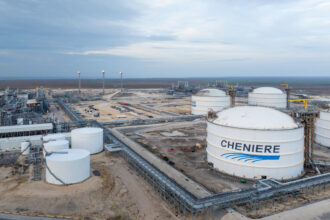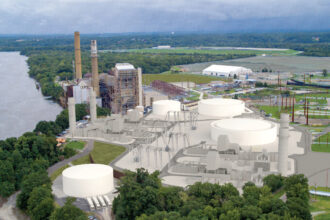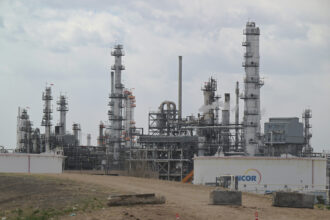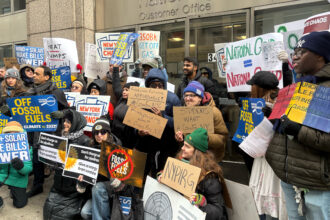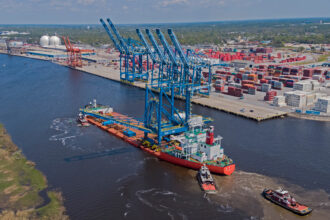Within the first two weeks of April’s Deepwater Horizon oil disaster, $36 billion of BP’s market capitalization evaporated when its stock took a plunge into the deep. Investors were jolted by the unfolding catastrophe, uncertain about when and how the oil, and the financial damage, could be capped.
The same kind of catastrophic failure is a risk for a number of BP’s competitors, an industry research firm said this week, as it unveiled assessments of the world’s oil and gas companies and their exposure to risks that are only now becoming part of prudent investment decisions.
“We think BP is not an outlier—it’s a systemic issue,” said Yulia Reuter, the head of oil and gas research at MSCI. “All of these companies are taking on more risk to recover oil from the frontier and delivering it to market. What it comes down to is who are the best companies who can mitigate that risk.”
The firm found that many of the traditional international players fell to the bottom of their ratings list. Chevron, BP, Occidental, Exxon Mobil, Petrochina and Murphy Oil all scored poorly in the analysis.
MSCI, a financial analysis firm with special expertise in assessing the value of intangibles like carbon risk, investigated the petroleum industry’s performance in five key categories: operations, health and safety; ability to access resources in emerging markets; carbon emissions; investment in alternative energy; and investment in unconventional fossil fuels like oil sands and oil shale, coal bed methane and coal seam gas, and both gas-to-liquid and coal-to-liquid fuels.
Australia’s Origin Energy, Norway’s Statoil, Austria’s OMV and Brazil’s Petrobras occupied the top of MSCI’s overall ranking.
“These are businesses taking on more risk—in emerging markets, alternative energy and in other places—that are positioned to withstand regulatory pressures and have put the commensurate risk management structures in place,” Reuter said.
Reuter, who presented her analysis via a public webinar, said there is a consensus growing in financial markets that many difficult-to-quantify issues oil and gas companies face need to be understood for their potential impact on investment decisions.
Long-term, the response to these issues may well determine whether today’s oil and gas businesses can become the world’s future energy companies. Among the high profile issues Reuter mentioned were response to political instability, human rights violations, environment and worker health and safety and the need for the companies to become providers of alternative energy, power generation and smart infrastructure.
Cannot Rely on Ever-Increasing Prices
MSCI also noted in its report that oil and gas companies could not rely upon ever-increasing prices for petroleum products from reserves that are costlier and ever more technically challenging to recover.
“As economies were stretched thin by the escalating cost of energy, high oil prices have triggered three of the last four global recessions, which consecutively led to the collapse in demand,” analysts concluded. “Hence, we do not assume that high oil prices will persist indefinitely to sustain producers’ profitability, given increasing costs of unconventional supplies.”
Reuter said the Deepwater Horizon incident is a warning sign to prudent investors, who must realize that companies will continue to take on more risks to bring energy supplies to market. Those companies that invest in practices and systems that mitigate those risks will be less likely to suffer a major catastrophe.
“BP highlighted the increased risk profile of the petroleum industry and the problem didn’t remain confined to it. A lot of funds got burned on BP,” Reuter said. “These risks can be very expensive for the company and the society.”
During the early days of the Horizon disaster, financial markets were filled with speculation about the fate of BP, whether it could survive intact, or even be taken over. British government officials voiced fears for pensioners whose income relied on funds with large holdings of plummeting BP stock.
MSCI said BP’s liabilities would eventually range from $3.2 billion to $18.2 billion. The company agreed to set aside $20 billion in escrow to pay what it owes, excluding fines and penalties. Adding to that stress, the company’s interest in the Gulf of Mexico alone, said to be at $37 billion, is also subject to tighter regulation and oversight in the wake of the disaster.
“We estimate that in the conservative scenario, the total cost of H&S (health & safety) mismanagement to BP over the 2005-2013 period may reach close to 15 percent of BP’s average annual operating cash flows,” analysts wrote as part of their explanation for why the company’s stock has been steadily downgraded four notches from AAA before the incident in 2009 to BB.
News Not All Bad for BP
But not all the news in the investment analysis was bad for BP. Though the company is considered a high-risk holding because of its heightened exposure to tightening environmental, health and safety regulations in the Gulf of Mexico, MSCI said it does better in other key areas.
BP is in a good position to counter air emissions, water shortage and land contamination problems, along with potential litigation from communities, MSCI said, and has the capacity to move toward renewable energy by meeting new low-carbon standards for transportation fuel. The company also received high marks in its oil sands operations for its risk management capacity.
The firm also said the company has shown one of the best structural management responses to lower greenhouse gas emissions, reduce gas flaring, become more energy efficient, commercialize carbon sequestration and focus more on natural gas.
According to MSCI, BP is among those in the best competitive position in the emerging alternative energy market through its work to meet demand for non-food-crop biofuels. According to the report, BP showed the largest reduction of greenhouse gases among its competitors, decreasing in absolute emissions between 2002 and 2008 by 31 percent.
“Nevertheless,” the analysts wrote, “as applied to our OH&S (Operations, Health and Safety) score of BP, the scale of the accident—potentially being the world’s third largest marine spill—makes BP an irresponsible operator. We reduced BP’s overall OH&S score to zero due to the combination of the magnitude of the environmental impact and the associated financial materiality.” (emphasis original)
BP’s strong performance in a number of MSCI’s analytical categories underscored one of the primary lessons for investors parking their money in an industry operating in ever-riskier environments: a single disaster has the potential to bring financial catastrophe to a company and reach around the globe.
About This Story
Perhaps you noticed: This story, like all the news we publish, is free to read. That’s because Inside Climate News is a 501c3 nonprofit organization. We do not charge a subscription fee, lock our news behind a paywall, or clutter our website with ads. We make our news on climate and the environment freely available to you and anyone who wants it.
That’s not all. We also share our news for free with scores of other media organizations around the country. Many of them can’t afford to do environmental journalism of their own. We’ve built bureaus from coast to coast to report local stories, collaborate with local newsrooms and co-publish articles so that this vital work is shared as widely as possible.
Two of us launched ICN in 2007. Six years later we earned a Pulitzer Prize for National Reporting, and now we run the oldest and largest dedicated climate newsroom in the nation. We tell the story in all its complexity. We hold polluters accountable. We expose environmental injustice. We debunk misinformation. We scrutinize solutions and inspire action.
Donations from readers like you fund every aspect of what we do. If you don’t already, will you support our ongoing work, our reporting on the biggest crisis facing our planet, and help us reach even more readers in more places?
Please take a moment to make a tax-deductible donation. Every one of them makes a difference.
Thank you,





